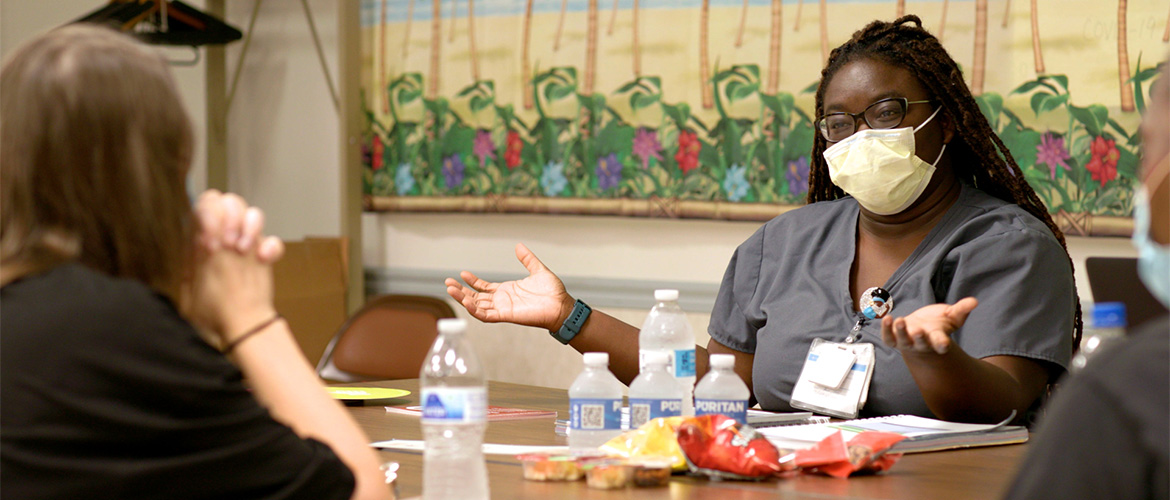After arriving in Peoria, Illinois, Dr. Rahmat Na’Allah quickly became aware of the disproportionately high rates of teen pregnancy and preterm births in the community’s mostly Black neighborhoods.
Na’Allah, director of the University of Illinois College of Medicine’s family medicine obstetrics fellowship and family medicine residency, sought opportunities and community allies to tackle the complex problem, leading to adoption of CenteringPregnancy. The nationally recognized program supplements individual patient care with health and prenatal education and social support to women in the same stage of pregnancy in group settings.
Group facilitators, including clinical and nonclinical staff, lead discussions about breastfeeding, domestic violence and family planning options before participants meet their providers for their one-on-one health checkups. The groups provide a nonjudgmental environment where they can share experiences and information, ask questions, and find peer support.
“By these women coming together and sitting together and having fellowship with other women that are in the same gestational age, they now have some sense of support — they have some level of hope,” says Na’Allah, who directs Peoria’s CenteringPregnancy programs.
In 2020 Health Care Service Corporation (HCSC) made a three-year $1.5 million commitment to help federally qualified health centers (FQHCs) and Indian Health Service clinics bring CenteringPregnancy to communities in states where HCSC’s plans provide health coverage. The funding allowed Na’Allah to implement CenteringPregancy at a third Peoria site, the newest at Heartland Health Services’ East Bluff clinic.
Research shows participation in CenteringPregnancy programs decreases preterm birth risks, increases breastfeeding rates and improves perceptions of peer support.
“I think to reach certain populations, you need new ideas,” says Dr. Anita Stewart, a medical director for HCSC in Illinois overseeing program implementation. “Centering works because not only do you get the traditional health care, but you get the support. The goal here is to meet a patient where they are.”
Expanding CenteringPregnancy's reach
Sixteen organizations in Illinois, New Mexico, Oklahoma and Texas have or are in the process of implementing the program as a result of HCSC’s investment, and the nonprofit Centering Healthcare Institute (CHI) is working with more sites to expand the program’s reach in those states. HCSC is targeting communities of color and where data shows disparities in maternal and infant health outcomes.
Nationwide, CHI has helped implement CenteringPregnancy programs at 500 clinics in 44 states.
“The goal is to make CenteringPregnancy a standard of care in their practices,” says Angie Truesdale, the nonprofit’s CEO. The model can be customized to support participants’ needs, no matter location.
The United States has one of the highest rates of maternal death in the industrialized world, and new analysis from the Centers for Disease Control and Prevention indicates 4 out of 5 pregnancy-related deaths could have been prevented. Receiving prenatal care late in a pregnancy or not at all increases risk of pregnancy complications and maternal deaths.
Black women are three times more likely to die from a pregnancy-related cause than white women, no matter their insurance coverage, employment status or educational background.
“There are no safe barriers from the disparities,” Stewart says. “If you are a black woman and you are pregnant, you still are at high risk, and education and economics are not saving graces.”
The CenteringPregnancy program reminds Stewart of how nontraditional settings such as churches and barber shops have become vital resources in their communities for circulating health information, including COVID-19 and prostate cancer education, to empower people.
“Everybody likes support and comradery, and they can be a big draw for people to come places,” Stewart says. “So, this group becomes an extension of family, and it makes it more likely that you will attend that group. No one's going to look down on you.”
Rachel Thomas, the CenteringPregnancy program director at Howard Brown Health in Chicago’s Englewood neighborhood, agrees. Her clinic, which HCSC also supports, primarily serves patients who disproportionately face health care challenges, including people of color and the lesbian, gay, bisexual and transgender community.
“The CenteringPregnancy environment is set up so one person who is willing to be vulnerable gives everyone in the group permission to be vulnerable,” Thomas says. “Patients have the answers, and they are much more educated than we give them credit for. They know what they want and what they deserve.”
Giving women a voice
During a recent CenteringPregnancy session in Peoria, program facilitator Kayvance Summerville guided a discussion on infant feeding options to educate participants and encourage them to advocate for themselves.
She wants to help empower women to ask for the support they need, make choices and have their decisions respected. For example, Summerville encourages participants to develop their labor and delivery plans and advocate for them, rather than concede and allow their doctor to decide.
“They find out here they can speak up for themselves,” Summerville says. “I'm glad that we have CenteringPregnancy because essentially it kind of opens up their minds to think for themselves. They can carry that on just throughout everyday life.”

